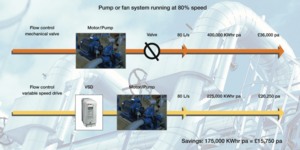Driving energy savings forward

Swapping new variable speed drives for old can help building managers meet the demands of the CRC Energy Efficiency Scheme. Whilst requiring new investment, there are ways to help ease the cost burden, with both public organisations and private companies offering help with costs — as Steve Ruddell explains
Variable-speed drives (VSDs) are a well regarded way of cutting energy use in motor-driven applications. Their ability to drive motors at the speed demanded by the process has saved millions of pounds in electricity costs for companies all over the world.
With drives being so well established, many have now seen years of service, and increasing numbers are due for replacement. New incentives and challenges such as the CRC Energy Efficiency Scheme are encouraging drive users to look at their existing drives and wonder if they can get even more savings by switching to more modern products. For instance ABB’s current drives offer over 10% higher efficiency than its most popular drive from the 1980s.
Swapping drives is made even more attractive by the prospect of interest-free loans from the Carbon Trust.
Another reason for replacement is reliability. The reliability of even the best maintained drives will decline after about 15 years of use, and a cost-effective replacement will be a priority for many drives users before they start to experience unacceptable levels of downtime.
The market for replacement drives continues to grow. In 2010 it is expected that 40% of all new drives purchased will be replacing existing drives. Schemes to help companies swap out old drives are now more common, such as the ABB scheme which offers at least 17.5% off the list price of a new ABB drive and will swap out and recycle incumbent drives from any manufacturer.
One of the major challenges currently facing building operators is the CRC Energy Efficiency Scheme legislation. It is designed to drive energy efficiency and carbon saving by giving organisations a financial incentive through emissions trading, combining this with corporate social responsibility incentives by publishing organisations’ performance in a league table.
The scheme targets an organisation's annual half hourly metered electricity use. If it is at least 6000 MWh they will qualify for the scheme, or typically those that spend £500 000 a year on electricity.
All large energy users, from Government departments to big business, have to take part in the scheme from April 1st, 2010.
A range of energy-saving methods are available to meet the CRC levels, including insulating buildings to a high standard, fitting low-energy lighting, controlling building temperature to an agreed standard and fitting voltage optimisation technology. Yet, the biggest impact on energy saving can come from applying VSDs to many of the electric motors used in buildings.
Using VSDs to control the flow of air and water in a HVAC system can save over half the energy compared to using traditional control methods such as throttling valves and dampers. This is because a small reduction in speed can make a big difference in energy use, as the power required to run a centrifugal pump or fan changes with the cube of the speed. A pump or fan running at 80% of full speed consumes only half as much energy as a unit running at full speed.
Because many pump and fan systems run at less than full capacity for much of the time, VSDs can produce huge savings. If a 100 kW pump is throttled by 20%, for example, the investment in a VSD will have a payback of typically six months based on continuous operation.

An example of the savings that can be made is to be found in hospitals. As extremely energy-intensive buildings, requiring a lot of pumped water and clean air, electricity can account for over half of a hospital’s total energy costs.
At Coventry Hospital, matched pairs of ABB high-efficiency motors and VSDs will reduce energy consumption for the ventilation system in the hospital’s block A by over 1400 MWh per year. Similar savings are expected for blocks B and C.
Replacing existing drives with their modern equivalents is being made easier with the help of the Carbon Trust, which is offering interest-free loans from £3000 to £500 000 to users wanting to invest in new technology like VSDs and energy-efficient electric motors.
As well as the energy-saving benefits of using the newest, most efficient drives and motors, there are also several other benefits of using the latest technology. The reduced size of modern drives saves plant room space, their lower component count improves reliability and more up to date technology means additional features, including more advanced control and communications capabilities.
ABB’s standard drive for HVAC comes pre-programmed with all common HVAC applications. With an easy-to-use panel allowing quick set-up, the drive has interfaces for all common bus standards, including BACnet, and includes many other useful features such as a fault logger and a real-time clock.
ABB is also addressing the needs of building-services consultants, many of whom may not be using the most up-to-date specifications. A checklist designed to give them the knowledge they need provides a definitive guide to all the product features and associated benefits available from today’s bespoke HVAC drives.
Today’s building managers have a great opportunity to improve the efficiency of their building systems. With the help of drives vendors and encouragement from Government bodies, they can begin to make drastic cuts in their energy costs.
Steve Ruddell is division manager for discrete automation and motion with ABB.








